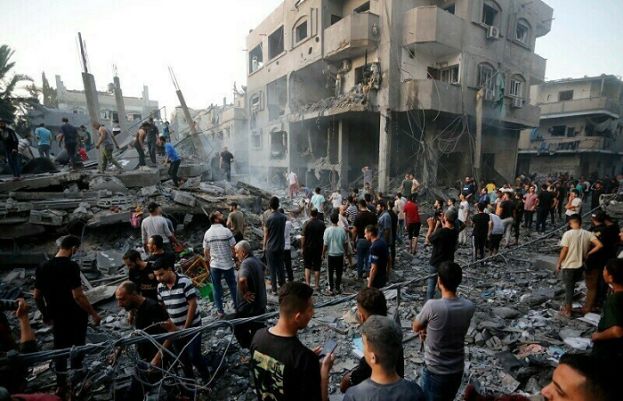The Gazan Health Ministry reported a grim statistic on Sunday, revealing that the Palestinian death toll from Israel’s war on Gaza has surpassed 25,000, with an estimated 70 percent of casualties being women and children. As the heartbreaking narrative of Gaza continues to unfold, the increasing number of casualties casts a dark cloud over the troubled area. The air is heavy with sorrow, echoing the struggles of a community facing the harsh realities of a full-throated conflict. In this tragic scenario, the innocent become unwitting participants, caught up in a destructive dance of violence. The recent 24-hour period witnessed a surge in casualties, with 178 Palestinians losing their lives and 293 sustaining injuries, underscoring the ongoing humanitarian crisis in the besieged enclave. As the UN chief described the scale of civilian killings in the Gaza Strip as “heartbreaking and utterly unacceptable,” the Gazan Health Ministry announcement anticipates the number of casualties and injured to rise since “dozens are still under the rubble.” Once sanctuaries, homes now crumble under the strain of Israeli criminal acts, leaving families shattered and bereaved. In early January, Gaza’s media office reported that Israel had dropped more than 65,000 tons of bombs on the territory. Analysis of satellite data cited by an international news agency shows that about 33 percent of buildings in the entire Gaza Strip have been destroyed. The United Nations estimates that 1.9 million people, nearly 85 percent of the population, have been internally displaced, while more than 90 percent face acute food insecurity. UN officials say about one in four people in Gaza are starving, as nowhere near the required amount of aid has been able to enter the enclave since the start of the war. “The humanitarian operation has become one of the most complex & challenging in the world,” the UN Relief and Works Agency for Palestine Refugees (UNRWA) said in a post on the social media platform X. The level of death, destruction, and displacement from the war is already without precedent in the decades-old Israeli-Palestinian conflict. Yet Israel’s relentless bombardment of the besieged Gaza Strip continues with no sign of easing, amid a growing humanitarian catastrophe and the looming threat of a regional spillover. The UN has repeatedly warned that its shelters, already struggling before the war, are unable to cope with the vast influx of displaced Palestinians. In the face of this human tragedy, there is a compelling plea for empathy, compassion, and a determined commitment to end the suffering. Each casualty represents more than a statistic; it is a poignant reminder of the profound human cost exacted by conflict. Speaking at a global summit in the Ugandan capital of Kampala, the UN secretary-general, António Guterres, denounced Israel’s three-month assault. “This is heartbreaking and utterly unacceptable. The Middle East is a tinderbox, and we must do all we can to prevent conflict from igniting across the region,” he said in his speech. While the Israeli government appears far from achieving its goals of crushing the Resistance group Hamas and freeing more than 100 hostages, Israeli Prime Minister Benjamin Netanyahu has vowed to keep up the offensive until Israel achieves “complete victory.” However, even some top Israeli officials have begun to acknowledge that those goals might be mutually exclusive. A member of Israel’s war cabinet, former army chief Gadi Eisenkot, said last week that the only way to free the remaining hostages was through a ceasefire. In an open criticism of Netanyahu, he said claims to the contrary amounted to “illusions.” As Netanyahu’s “illusions” continue to claim more and more innocent lives, the world watches with concern, ensnared in what seems like an endless cycle of violence. The need for a resolution becomes more urgent, yet the path to peace remains obscured by the delusions of a warmongering regime and its direct supporters like the U.S., which is predominantly fueling and financing the war. The international community grapples with the complexities of a region scarred by historical grievances, making the quest for a lasting solution a challenging journey.
Palestinian death toll from Israel’s war surpassed 25,000: Gaza Health Ministry

